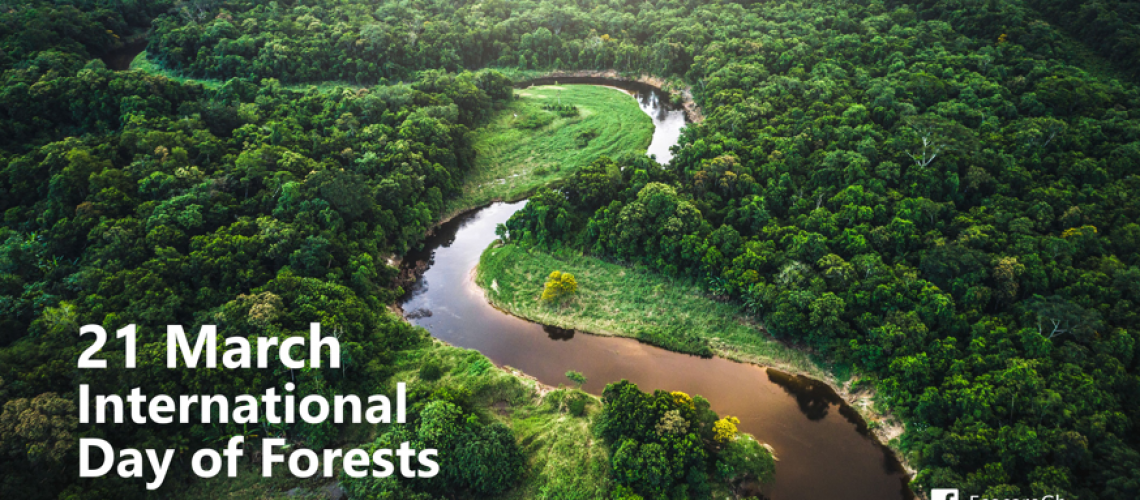Forests are an important part of Ghana’s landscape, and play a critical role in both the health of people and Ghana’s economy. Over the past 30 years, Ghana’s economy has developed significantly, however, despite this growth, Ghana is still heavily dependent on its natural resources, including its forests. Aside from the immense contribution to the country’s Gross Domestic Product (GDP), forests are also important to the health of the people and the planet.
As the world commemorates International Day of Forests 2023, under the theme, “Healthy Forests, for Healthy People”, it is important to use the opportunity to remind ourselves about the critical role forests play in promoting our health and well-being.
- Forests are a vital source of food and nutrition.
Nearly one billion people globally depend on harvesting wild food such as herbs, fruits, nuts, meat and insects for nutritious diets. In Ghana, the forest provides wild meat such as grasscutters, and antelopes which serve as a source of protein for people living in forest fringe communities and beyond. Globally it is estimated that wild meat consumption covers between 60 – 80 percent of the daily protein needs of people living in the tropics.

- Forests are natural pharmacies.
Around 50000 plant species, many of which grow in forests have medicinal value. Local communities use forest-derived medicines for a wide array of ailments and many common pharmaceutical medicines are derived from forest plants. In Ghana, herbal medicine is a critical part of our healthcare delivery system. Plants such as Acacia kamerunensis (Sawere), Paullinia pinnata (Tuantini) Senna siamea (Abootre), Terminalia superba (Ofram) and numerous others are key indigenous medicinal plants used in treating various ailments. Visit the Forest Research Institute of Ghana’s website for more examples (https://www.csir-forig.org.gh/tikfom/database).

- Healthy forests protect us from diseases.
Forests have traditionally served as a natural barrier to disease transmission between animals and humans, but as deforestation continues, the risk of diseases spilling over from animals to people is rising. More than 30 percent of new diseases reported since 1960 are attributed to land-use change, including deforestation. The Ebola virus disease epidemic in some parts of West Africa and other health disasters have shown us that the destruction of forests leads to the emergence of new diseases.

- Forests boost our mental and physical health.
Spending time in forests increases positive emotions and decreases stress, blood pressure, depression, fatigue, anxiety and tension. Trees in cities also absorb pollutant gases from traffic and industry and filter fine particulates such as dust, dirt and smoke, which help shield urban populations from respiratory diseases. In a busy, noisy, concrete city like Accra, the Achimota forest serves as the lung city by absorbing the excess carbon dioxide and purifying the air. It also provides important social and ecological benefits including serving as a serene place for prayers and meditation, therefore, playing a significant role in the spiritual and mental well-being of many Ghanaians.

- Forests play a central role in combating the biggest health threat facing humanity: climate change.
Healthy forests help keep global warming in check, according to the Food and Agriculture Organisation (FAO), forests contain 662 billion tonnes of carbon, which is more than half the global carbon stock in soils and vegetation. Forests and trees also help buffer exposure to heat and extreme weather events caused by climate change, which poses a major global health challenge. For example, trees properly placed around buildings cool the air and can cut air conditioning needs by up to 30 percent, also saving energy.

- Forests are under threat and need our help.
According to statistics for the FAO, ten million hectares of forests, an equivalent of about 14 million football pitches of forest were lost per year to deforestation between 2015 and 2020. Wild Fires affected approximately 98 million hectares of forest globally in 2015. According to the Global Forest Watch, Ghana lost 101kha of natural forest, equivalent to 62.9Mt of CO₂ emissions in 2021. The high deforestation rate in Ghana can be attributed to the menace of galamsey, illegal logging, agriculture, wildfires and among other factors.

Despite efforts to restore degraded forests in Ghana, the high rate of deforestation is making it a ‘wild goose chase’. EcoCare Ghana through the European Union Funded Landscapes and Environmental Agility across the Nation (LEAN) Project and Community-led Restoration Project funded under the AFR100 Terramatch Fund by One Tree Planted, is working to complement the Government’s forest restoration efforts to combat climate change and promote sustainable development. Forest restoration efforts help to rebuild critical habitats, store carbon, and provide benefits such as erosion control and water purification.
Forests are an important part of Ghana’s landscape and play a critical role in promoting sustainable development. We must continue to work together to conserve and restore these critical ecosystems for future generations and protect our health and planet.






